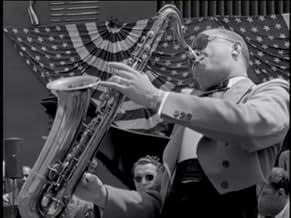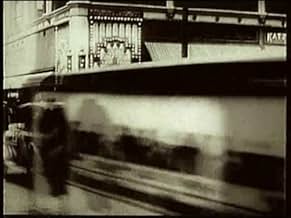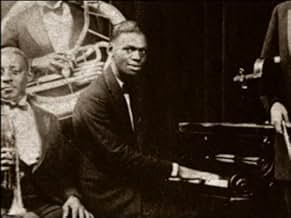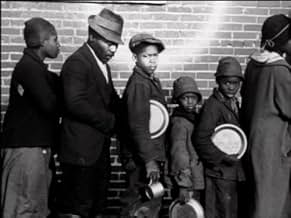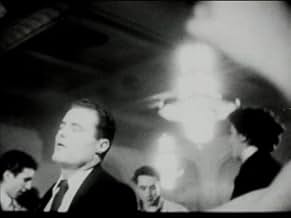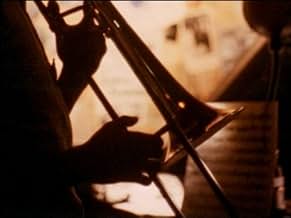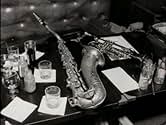Jazz: A Film by Ken Burns
- Minissérie de televisão
- 2001
- 1 h 48 min
AVALIAÇÃO DA IMDb
8,6/10
2,7 mil
SUA AVALIAÇÃO
Adicionar um enredo no seu idiomaA survey of the musical form's history and major talents.A survey of the musical form's history and major talents.A survey of the musical form's history and major talents.
- Indicado para 5 Primetime Emmys
- 2 vitórias e 7 indicações no total
Explorar episódios
Avaliações em destaque
This is a compilation that is pretty much essential for those coming to the music for the first time, and will afford a lot of pleasure to those who have been listening for some time too. Some of the film clips are breathtaking: you ask yourself 'where did he find that?' The focus is on the great figures of Armstrong, Ellington, Parker and Billie Holiday, which is appropriate since these people did more than others to shape the course of the music over the last century, but many viewers will be frustrated by the glancing attention and even omission given to some musicians. Why was it not thought necessary to show 'Lockjaw' Davis, Johnny Griffin, Tadd Dameron, Red Garland, Art Pepper, Lee Konitz, Jo Stafford and many more? Chick Corea and Keith Jarrett, where are they? It seems as though Winton Marsalis decided who the great ones were, and the worthy ones could be ignored.
I will praise the editors who took this huge mass of material and made something coherent and entertaining out of it. We must forever be in their debt. The way is now clear for some documentarist to make a series on jazz from 1960 to today.
I will praise the editors who took this huge mass of material and made something coherent and entertaining out of it. We must forever be in their debt. The way is now clear for some documentarist to make a series on jazz from 1960 to today.
10RobT-2
As a jazz fan for over 20 years now, ever since I first encountered the 6-LP "Smithsonian Collection of Classic Jazz" in the library of the college where my father taught, I could go on and on about all the stuff Ken Burns and company left out. However, part of me keeps imagining some kid latching onto this program the way I did with the Smithsonian LP's, then searching out jazz recordings, books on the subject, and recent copies of "Down Beat" magazine. Multiply this scenario by an unknown number (hundreds? thousands, perhaps?), not just with literal kids but all kinds of people open to discovery in the same way, and you get some idea of how I feel about the program.
Speaking again as a longtime jazz fan, even though I was a bit disappointed that more "modern" and avant-garde jazz wasn't included, the portions of "Jazz" covering swing were a revelation--I've never had such a direct visceral connection to that music before, though I've enjoyed it from time to time. This illustrates the major merit of "Jazz", the way it puts the viewer inside the world in which the music happened. One reason the swing segments are the best in that regard is that not only do we get to see what else was going on in the world at that time, we get to see the audience's interaction with the music--specifically, the dancing. This may be why "modern" jazz isn't emphasized as much; the audience's reaction couldn't be captured on camera in the same way.
The one theme I would have liked "Jazz" to cover in greater depth was its decline in popularity after swing had run its course and most young musicians were either getting into bebop or dixieland (the postwar revival of the latter being one of the program's more mysterious omissions). I think part of the problem lies in the definitional boundaries some of jazz's defenders have drawn around it. It seems to me that jazz was at its healthiest when its practitioners drew upon other musical traditions for ideas; this could mean classical music, showbiz pop, or most often other traditions of black music, notably the blues.
Once jazz had been firmly defined as an improvised music emphasizing certain kinds of instruments and instrumental combinations, there developed a tendency among jazz musicians to draw almost exclusively from earlier jazz styles, often the "purer" styles of recent vintage. After a certain point, any attempts at a new style were open to criticism over whether they were "really" jazz. (It's interesting, in this regard, that most of jazz's innovators have resisted purists' expectations of "jazz" musicians; just try to think of any musicians who added to the jazz vocabulary without doing something along the way that upset some group of purists or another.) Some new styles were accepted as the real stuff, others were not, which is a pity since some of them, especially rhythm & blues, might have lead to the reinvigoration of jazz as a popular art.
Louis Jordan is singled out in "Jazz" as someone who led black audiences awa y from jazz, yet his music developed directly from the swing music of the 30's and early 40's. How differently would jazz history be written if Jordan's kinds of innovations, which kept the music true to the experience of urban blacks without alienating potentially curious whites, were accepted as "real" jazz? After all, it's only a short step from Jordan to early rock &' roll.
It strikes me that, if jazz is really central to American music, an honest portrayal of jazz would include a full accounting of its influence on other American musical styles. Louis Jordan is one such example; the hard bop influence on the great 60's soul bands (notably Booker T. & the MG's, James Brown's bands, and the guys at Motown) is another; the use of jazz-schooled musicians by such disparate yet seminal bandleaders as Bob Wills and Spike Jones is yet another. Finally, jazz purism has robbed the music of some potentially valuable innovators, the best example being Jimi Hendrix, exactly the kind of instrumental prodigy who would have been a natural for jazz in an earlier time, but who went from r&b bands to rock & roll instead (contrast Ornette Coleman, who went from r&b bands to the jazz avant-garde).
And yet the faults of "Jazz" don't cancel out its many fine points, though they do throw them into sharper relief. I can't imagine any jazz fan failing to enjoy the music, and only a few who fail to learn something new about it. The fallout from "Jazz" as an event--the numerous arguments over the program's merits as history (many of these arguments concerning, at bottom, the definition of jazz) and the recent spur of jazz record (CD, tape, whatever) sales--is icing on the cake. On my own personal rating system, "Jazz" ranks just shy of an A+ (a "perfect" film) because I can imagine it being done better. Nevertheless, I'm giving it an IMDB rating of "10" for its entertainment value, its educational value, its status as a ublic event, and on general principles.
Speaking again as a longtime jazz fan, even though I was a bit disappointed that more "modern" and avant-garde jazz wasn't included, the portions of "Jazz" covering swing were a revelation--I've never had such a direct visceral connection to that music before, though I've enjoyed it from time to time. This illustrates the major merit of "Jazz", the way it puts the viewer inside the world in which the music happened. One reason the swing segments are the best in that regard is that not only do we get to see what else was going on in the world at that time, we get to see the audience's interaction with the music--specifically, the dancing. This may be why "modern" jazz isn't emphasized as much; the audience's reaction couldn't be captured on camera in the same way.
The one theme I would have liked "Jazz" to cover in greater depth was its decline in popularity after swing had run its course and most young musicians were either getting into bebop or dixieland (the postwar revival of the latter being one of the program's more mysterious omissions). I think part of the problem lies in the definitional boundaries some of jazz's defenders have drawn around it. It seems to me that jazz was at its healthiest when its practitioners drew upon other musical traditions for ideas; this could mean classical music, showbiz pop, or most often other traditions of black music, notably the blues.
Once jazz had been firmly defined as an improvised music emphasizing certain kinds of instruments and instrumental combinations, there developed a tendency among jazz musicians to draw almost exclusively from earlier jazz styles, often the "purer" styles of recent vintage. After a certain point, any attempts at a new style were open to criticism over whether they were "really" jazz. (It's interesting, in this regard, that most of jazz's innovators have resisted purists' expectations of "jazz" musicians; just try to think of any musicians who added to the jazz vocabulary without doing something along the way that upset some group of purists or another.) Some new styles were accepted as the real stuff, others were not, which is a pity since some of them, especially rhythm & blues, might have lead to the reinvigoration of jazz as a popular art.
Louis Jordan is singled out in "Jazz" as someone who led black audiences awa y from jazz, yet his music developed directly from the swing music of the 30's and early 40's. How differently would jazz history be written if Jordan's kinds of innovations, which kept the music true to the experience of urban blacks without alienating potentially curious whites, were accepted as "real" jazz? After all, it's only a short step from Jordan to early rock &' roll.
It strikes me that, if jazz is really central to American music, an honest portrayal of jazz would include a full accounting of its influence on other American musical styles. Louis Jordan is one such example; the hard bop influence on the great 60's soul bands (notably Booker T. & the MG's, James Brown's bands, and the guys at Motown) is another; the use of jazz-schooled musicians by such disparate yet seminal bandleaders as Bob Wills and Spike Jones is yet another. Finally, jazz purism has robbed the music of some potentially valuable innovators, the best example being Jimi Hendrix, exactly the kind of instrumental prodigy who would have been a natural for jazz in an earlier time, but who went from r&b bands to rock & roll instead (contrast Ornette Coleman, who went from r&b bands to the jazz avant-garde).
And yet the faults of "Jazz" don't cancel out its many fine points, though they do throw them into sharper relief. I can't imagine any jazz fan failing to enjoy the music, and only a few who fail to learn something new about it. The fallout from "Jazz" as an event--the numerous arguments over the program's merits as history (many of these arguments concerning, at bottom, the definition of jazz) and the recent spur of jazz record (CD, tape, whatever) sales--is icing on the cake. On my own personal rating system, "Jazz" ranks just shy of an A+ (a "perfect" film) because I can imagine it being done better. Nevertheless, I'm giving it an IMDB rating of "10" for its entertainment value, its educational value, its status as a ublic event, and on general principles.
Don't bother with the U.K. version (12 hours) buy the USA version (19.5 hours) it contains more and can usually be found at lower cost.
Covers the birth of jazz, swing era, move to bebop, free modal very well, but there is only scant coverage of more modern moves in the field of jazz.
Mr Burns has argued that he is more of an historian than a critic and as such he can only really deal with the phases of jazz that are from the past. This line of reasoning is, I think, not un-reasonable.
A nice touch on the DVDs is that when a piece of music is playing then pressing the "info" button on the DVD or its handset, brings up a screen about the music being played, e.g. title of music, who wrote it, who is playing, when was it recorded, etc.
Covers the birth of jazz, swing era, move to bebop, free modal very well, but there is only scant coverage of more modern moves in the field of jazz.
Mr Burns has argued that he is more of an historian than a critic and as such he can only really deal with the phases of jazz that are from the past. This line of reasoning is, I think, not un-reasonable.
A nice touch on the DVDs is that when a piece of music is playing then pressing the "info" button on the DVD or its handset, brings up a screen about the music being played, e.g. title of music, who wrote it, who is playing, when was it recorded, etc.
It's very sad to read how many people were bowled over by this so-called documentary. Sadder yet to see how many were coerced into thinking that this was a legitimate history of jazz. Let us look at some facts:
Before beginning this project, Ken Burns had in his own words, "maybe two" jazz cds. Because of this, he looked toward Wynton Marsalis for guidance. As a result, the entire documentary was slanted in accordance with Wynton's beliefs--the strongest belief being that white people have nothing to contribute to the genre.
This in mind, it is obvious that taking all of one's cues from him is a rather large mistake, as evidenced in Ken's show. For example, the entire West Coast movement was written off. There is no mention of Stan Kenton, Woody Herman, and many of the other great artists and innovators, simply because they were the wrong color...white. In addition, the trombone is not considered to be relevant past the big band era (Sorry J.J. Johnson!! Sorry Kai Winding!). Then of course, there is the statement made that no worthwhile jazz was composed after (approximately) 1965...well...until WYNTON MARSALIS came along!! What a slap in the face!! This is just the tip of the iceberg.
Yes, there were some good things in the show. The old footage of the great ones: Armstrong, Ellington, Basie, etc. It's too bad that Burns neglected to interview many of the musicians who are still alive that played in these organizations. Clark Terry, one of the finest trumpet players to ever walk the earth, and who played in BOTH Ellington and Basie's bands, ended up having less than 2 minutes, speaking about things that were relatively trite.
The main message that permeated this series was this: Black people created jazz, and whites made only minor contributions. Wynton has stated before that there is nothing that a white person could teach him about jazz. This means in Wytnon's mind that Django, Kenton, Bill Evans, Bix, Brubeck, Chet Baker, Gerry Mulligan, Jack Teagarden, Kai Winding, etc., etc., etc...have nothing to contribute, because they're white. Sad, isn't it?
Hopefully, someday Wynton and Burns will see that two wrongs don't make a right. Until then, if you want a true history of jazz, pick up a book called "Meet me at Jim and Andy's" by Gene Lees.
Before beginning this project, Ken Burns had in his own words, "maybe two" jazz cds. Because of this, he looked toward Wynton Marsalis for guidance. As a result, the entire documentary was slanted in accordance with Wynton's beliefs--the strongest belief being that white people have nothing to contribute to the genre.
This in mind, it is obvious that taking all of one's cues from him is a rather large mistake, as evidenced in Ken's show. For example, the entire West Coast movement was written off. There is no mention of Stan Kenton, Woody Herman, and many of the other great artists and innovators, simply because they were the wrong color...white. In addition, the trombone is not considered to be relevant past the big band era (Sorry J.J. Johnson!! Sorry Kai Winding!). Then of course, there is the statement made that no worthwhile jazz was composed after (approximately) 1965...well...until WYNTON MARSALIS came along!! What a slap in the face!! This is just the tip of the iceberg.
Yes, there were some good things in the show. The old footage of the great ones: Armstrong, Ellington, Basie, etc. It's too bad that Burns neglected to interview many of the musicians who are still alive that played in these organizations. Clark Terry, one of the finest trumpet players to ever walk the earth, and who played in BOTH Ellington and Basie's bands, ended up having less than 2 minutes, speaking about things that were relatively trite.
The main message that permeated this series was this: Black people created jazz, and whites made only minor contributions. Wynton has stated before that there is nothing that a white person could teach him about jazz. This means in Wytnon's mind that Django, Kenton, Bill Evans, Bix, Brubeck, Chet Baker, Gerry Mulligan, Jack Teagarden, Kai Winding, etc., etc., etc...have nothing to contribute, because they're white. Sad, isn't it?
Hopefully, someday Wynton and Burns will see that two wrongs don't make a right. Until then, if you want a true history of jazz, pick up a book called "Meet me at Jim and Andy's" by Gene Lees.
10PCARONA
I've never been one to send in any type of critique or review to any type of website, but after viewing the Ken Burns "jazz" documentary, I knew this was a call to arms. I've never been so moved before by any film/doc etc.. through the brilliant use of historical footage and expert insight that dances along with the music of the day it's a perfect marriage of sound and vision. I was actually brought to tears of joy several times throughout the series. if anyone is even remotely interested in any type of American history/music of any kind or just a lover of great programming ,this is a must for all. A true American classic! not only did this series reconnect me with such intricate American heritage, but introduced me to a whole new world of exquisite, fascinating music that I immediately fell in love with. For this I am forever grateful to Mr. Burns. the only thing I'm not happy about is the fact that now I've been on a constant quest and spending spree of most of my weekly paycheck on a jazz cd purchasing frenzy!!! Ohh well , it's worth every penny ,keep up the superb work and now its time to venture into the civil war series.
Você sabia?
- ConexõesFeatured in WatchMojo: Top 10 Documentary Mini Series (2015)
Principais escolhas
Faça login para avaliar e ver a lista de recomendações personalizadas
- How many seasons does Jazz have?Fornecido pela Alexa
Detalhes
- Data de lançamento
- Países de origem
- Central de atendimento oficial
- Idioma
- Também conhecido como
- Jazz
- Empresas de produção
- Consulte mais créditos da empresa na IMDbPro
- Tempo de duração
- 1 h 48 min(108 min)
- Cor
- Mixagem de som
- Proporção
- 1.33 : 1
Contribua para esta página
Sugerir uma alteração ou adicionar conteúdo ausente


